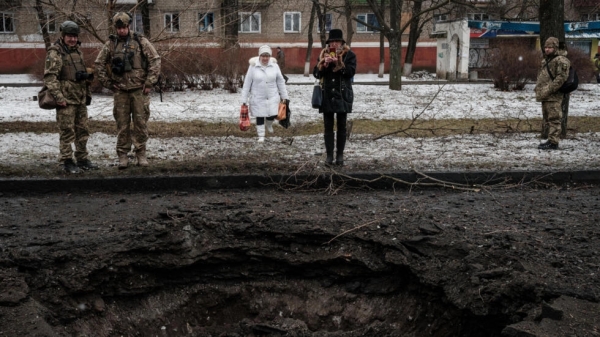On February 2023, International Center for Transitional Justice (ICTJ) published a report titled “Reflections on Victim-Centred Accountability in Ukraine”, written by Kelli Muddell
and Anna Myriam Roccatello. The aim of the paper is to report and analyse the numerous initiatives taken by Ukrainian authorities and members of the international community to look into and prosecute war crimes and other human rights violations committed in Ukraine since Russia invaded the nation in February 2022. In doing this, the authors consider the different legal tools available to judge war crimes and crimes against humanity, reminding that criminal accountability is just one dimension of justice, and that it is necessary to adopt a case-by-case approach to ensure the judgement of the crimes committed. Particularly, the report highlights the numerous obstacles the international community is facing, and it emphasises how transitional justice methods can be used in conjunction to provide victims with justice and reparations, thus establishing the groundwork for a more inclusive and democratic Ukraine.
In the first part, the report outlines from a historical point of view the situation in Ukraine from 2014 until the escalation of the conflict on the 24th of February 2022. The authors cover the most relevant issues occurring in those years: the Maidan Revolution in 2014 and the escalation of violence in the eastern part of the country; the illegal annexation of Crimea by the Russian Federation and the infringement of the Minsk Agreements by both parties involved; the escalation of tensions in 2021 and the failed attempt of the US to mediate the situation; Russian president Vladimir Putin ordered the beginning of “a special operation” “to demilitarize and de-Nazify Ukraine and end the alleged genocide of Russians in Ukrainian territory”, formally invading the country. At this point, Russian forces immediately occupied the main cities of the countries, including the capitol, using explosive weapons and bombing both civilian and military objectives, which represents a violation of the main principle of International Humanitarian Law (IHL) of distinction between the objectives, and the immunity of the civilian ones. According to the data reported in the paper issued by the Office of the High Commissioner for Human Rights, it is estimated that over 6,000 civilians have died and more than 9,000 have been injured since the invasion started in February 2022. However, it is believed that the numbers are significantly greater. Significant damage has been done to crucial infrastructure, and millions of people have been forced to leave Ukraine or move to other regions of the nation, creating millions of refugees and Internally Displaced Persons (IDPs). Russian forces have seriously violated international humanitarian and human rights legislation, according to the most recent report of the Independent International Commission of Inquiry on Ukraine (IICIU), which was formed by the UN Human Rights Council in March 2022. The commission documented indiscriminate attacks on civilians and individuals trying to leave the country, summary killings, torture, maltreatment, sexual and gender-based violence (SGBV), illegal detentions, forced deportations, and the bombing of humanitarian corridors.
Afterwards, the report goes into the details of the legal tools available for the judgement of these crimes. It firstly highlights that the conflict in Ukraine represents a new setting for the application of transitional justice and raises certain concerns about its execution. To begin with, the situation in Ukraine is an international military war between two states, which has not been common since WWII. This is more complicated as practitioners have traditionally pursued such measures and policies in the context of internal disputes. Moreover, another point to consider is that the situation in Ukraine is still ongoing, thus it is not possible yet to establish the exact number of victims and violations.
The authors emphasise the importance of multilateralism and the international efforts that the international community is making for the accountability of Russian crimes. For instance, they underline how the use of social media helped the spreading of information and documentation about violence and crimes, together with the field investigation implemented by the UN and other affiliated international organisations. Furthermore, many members of the international legal community have been looking into ways to pursue the crime of aggression. This offence has never been prosecuted, exposing “a gaping hole in the enforcement of international criminal law,” according to numerous legal specialists. In contrast to other atrocity crimes outlined in the Rome Statute, the ICC cannot prosecute non-state party nationals for this crime. The debate over how to prosecute the invasion of Ukraine in light of the ICC's jurisdictional limitations has resulted in a variety of possibilities, including the following:
- A special tribunal international or hybrid, for the crime of aggression.
- A Ukrainian high war crimes court based on the domestic legal system.
- A hybrid tribunal under the auspices of the Council of Europe.
- A model indictment for the crime of aggression committed against Ukraine.
- An amendment to the Rome Statute to allow the ICC to prosecute the crime of aggression after the authorization of the UN General Assembly.
Overall, the report underlines not only the difficulty in the establishment of a proper legal organ, but also in the gathering of reliable information. However, the most important point that is highlighted in the conclusion is that, the legal tools that will be used for the accountability of these war crimes and crimes against humanity, must ensure a fair and just judgement for the victims and the reconstruction of a peaceful and democratic state.
To read more, visit:
https://www.ictj.org/resource-library/reflections-victim-centered-accountability-ukraine
https://www.state.gov/supporting-justice-and-accountability-in-ukraine/
by Alexia Tenneriello







